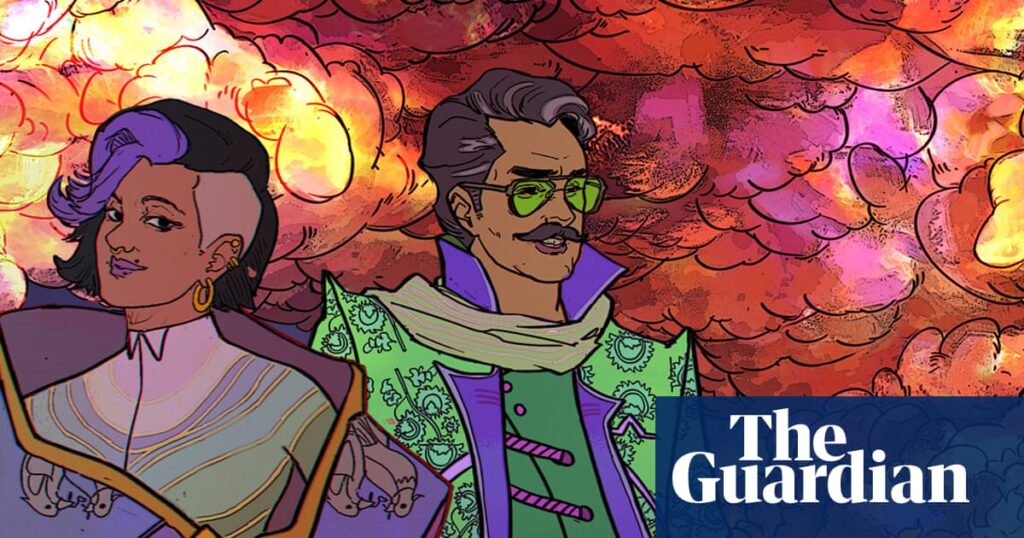The demo of All Will Rise begins with a win for lawyer Kuyili. She has just successfully argued in front of a court that a river running through the fictional version of the Indian city of Muziris should have the same rights as a person. According to Kuyili, this has precedent – after all, companies can argue in court similarly to individual people.
The excitement over this historic win doesn’t last long as, soon after, the river is polluted by a large oil spill, which catches fire, the toxic smoke enveloping several neighbourhoods. Pollution on this scale has devastating effects, so Kuyili and her colleagues begin investigating.
All Will Rise is effectively a deck-building game built around verbal sparring. In order to prepare for an important conversation, you first send Kuyili and her colleagues to different people in the community to gather information. Those trips net you cards, which you can then use as arguments. Claims cards can appeal to different emotions and each one has a different validity based on the information you have gathered. Saying that a corporation’s illegal waste disposal is responsible for the pollution of the river, for example, may get your opponent fired up, but if the card is mere speculation, as opposed to something you can back up with definitive proof, they may reject it.
While it’s a lot to absorb at first, the card-based conversations aim to represent the many ways a conversation can go. While developer Speculative Agency cites courtroom comedy Ace Attorney as one of its inspirations, shouting “Objection!” will not necessarily get you what you want here.
“Talking to people in All Will Rise is based on the idea that you often partner with another person when you’re having a conversation,” Speculative Agency’s co-founder and producer Niels Monshouwer says. “In Dutch we use the word gesprekspartner, conversational partner, for the person you’re talking to, and conveying that feeling of partnering with someone was important to us.”
In conversation and information gathering, characters expend emotional energy, a system based on what it can take out of you to engage in activism or simply keep up with the news. “Looking at the state of the world, we experience the same pain that everybody in their right mind is having,” says narrative director Meghna Jayanth. “But every time we meet, we feel empowered, stronger, happier. There are so many people out there trying to do the right thing. Don’t stay alone – organise, collaborate. This is where you will feel strong. We want the game to give people that feeling, and hopefully take that back out into the real world.”
All Will Rise is not only set in India. Each chapter will shed light on the environmental challenges in a different part of the world and people’s efforts to counteract them. “We haven’t completely decided yet, but we are thinking about Puerto Rico, the Netherlands and maybe Nigeria,” says Monshouwer. “The first case deals more with pollution, corporate exploitation and local government corruption. But we’re also thinking about topics such as biodiversity loss, climate change and destruction of ocean floors due to mining.”
Speculative Agency, which is planning a Kickstarter campaign to raise funding for the game, wants to include countries its developers are based in, which Monshouwer feels is crucial for tackling these subjects with authenticity. Another important driver for the studio is the work of its science and impact director, Joost Vervoort, who is an associate professor at Utrecht University in the Netherlands, working at the intersection of games and sustainability. Vervoort’s research group Anticiplay, has already explored how the climate crisis can be dealt with in games and is working to make sure All Will Rise can empower players with real-life facts around climate activism.
The team has found that while the number of games tackling real-world issues is rising, there is still a lot of space for improvement. “In our first chat together we found that too many games that deal with climate change, pollution or other forms of societal collapse fall into two categories: green god games and toxic wasteland games,” says Monshouwer.
“Toxic wasteland games are games where the collapse is a backdrop and the message is that there is no hope. Green god games put you into the shoes of an omnipotent being that decides where to put magic machines that clean up pollution. It oversimplifies the problem to a technical instead of a societal one, and nobody in the world has that much power. We wanted to make games about the process of change and what you can do as an individual within a community, instead of being the lone hero.”
While the subjects that All Will Rise tackles are heavy, Jayanth says that it is a joyful game at its core. The team has even described the game as “inappropriately joyful” given, well, everything. “If we look around at the world right now, it would be easy to say it’s inappropriate to feel joy,” says Jayanth, who has long used her position in the gaming industry for activism. “But joy powers transformation. Rage does too, and we have plenty of that in the game as well. But we as a team feel like hope is the only useful political response to the challenges facing us all.”
Ultimately, All Will Rise is meant to show that it’s never too late to get involved in activism, even though the challenge can feel daunting. “Our ideal reaction to the game would certainly be if someone went out and got involved,” Jayanth says. “There are many more types of activism than tying yourself down somewhere or joining a demonstration, and we hope people will feel inspired to give it a try.”

